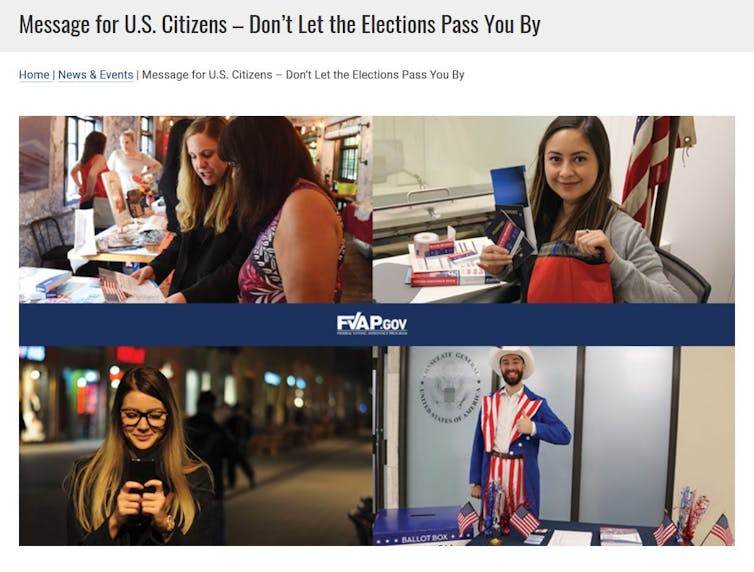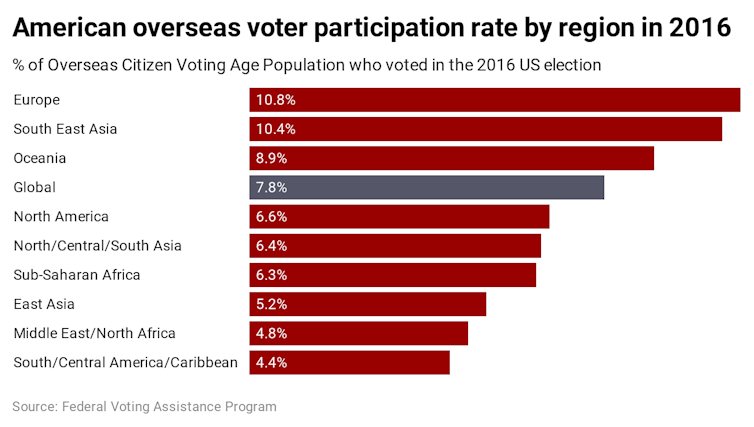Americans living and serving overseas could tilt the 2020 election – if only they voted
- Written by Monica Duffy Toft, Professor of International Politics and Director of the Center for Strategic Studies at The Fletcher School of Law and Diplomacy, Tufts University
U.S. citizens who live abroad are a largely untapped voter pool big enough to decide the presidency.
In the 2000 contested presidential election, Republican candidate George W. Bush’s campaign relied on 680 overseas military ballots to tilt Florida in Bush’s favor[1].
According to The New York Times, that was part of the Republicans’ strategy[2] to tally as many overseas ballots as possible in counties that favored Bush – even those without postmarks or validated signatures. In Florida counties that favored Al Gore, they worked to disqualify overseas ballots.
Bush beat Gore by 537 votes[3].
Just under 5 million U.S. citizens live abroad, serving in the military and embassies or just living in another country[4]. In 2018 an estimated 2.9 million of them were of voting age, according to a 2018 Federal Voting Assistance Program report[5] – more than the population of Rhode Island, Delaware and Wyoming combined.
As a political scientist who studies demographics and politics[6], I have observed how different voting blocs, even small ones, can affect the outcome of elections. Three million people is more than enough people to decide a presidential or congressional race with narrow margins.
To do that, though, Americans who live abroad would have to actually vote.
How to vote from abroad
Generally, U.S. citizens abroad may may vote in presidential, Senate and House races, though some states also allow them to vote for state and local candidates, and on referendums.
Absentee voting overseas is a relatively straightforward process. Ballots can be requested, transmitted and returned by mail, email or fax, depending on one’s state and registration status[7].
After identifying themselves as overseas voters from a particular state, U.S. citizens living abroad must complete and submit a Federal Post Card Application[8] each year to their local election officials, who then confirm voter eligibility. The Foreign Voter Assistance Program website[9] can help overseas voters determine which state they are eligible to vote in and request their ballot.
 A State Department webpage encourages its staffers in Uruguay to vote at https://uy.usembassy.gov/.
Department of State[10]
A State Department webpage encourages its staffers in Uruguay to vote at https://uy.usembassy.gov/.
Department of State[10]
For members of the military, voter residency is usually in the state that they consider to be their permanent home and where they previously had a physical presence. For overseas civilians, like embassy staffers, voting residence is the address in the state they lived in before leaving the United States. Americans who have never lived in the U.S. often register to vote under the American address of their parents or legal guardians[11].
Each state has its own rules on registering to vote from overseas; some are more flexible than others. Alaska, for example, allows citizens who have never resided in the U.S. to vote in federal elections if they have a parent or legal guardian who lives in Alaska. In Arizona, the parent or legal guardian must also be registered to vote in Arizona.
Americans overseas who registered to vote and requested their ballot but did not receive it in time can still vote using a federal write-in absentee ballot[12].
Overseas voters adrift
The voting rights of overseas voters were enshrined in 1986 with the Uniformed and Overseas Citizens Absentee Voting Act[13]. In 2010 the Military and Overseas Voter Empowerment Act[14] further codified international absentee voting procedures and added additional security and privacy protections.
Yet most Americans choose not to vote from abroad.
In the 2018 midterm election, 289,838 U.S. citizens overseas requested ballots and 135,507 of those ballots were returned, a turnout rate of 4.7% among all eligible American voters abroad[15]. Overall voter turnout that year was about 65% – 14 times higher. Just under 8% of overseas voters participated in the 2016 presidential election[16].
The participation of American voters abroad varies widely by the country they live in[17].
 Federal Voting Assistance Program[18]
Surveys of overseas voters[19] identify obstacles to voting, among them international mailing-related problems such as late ballots, privacy concerns over internet security and lack of knowledge about online voting. Overseas citizens also report feeling disconnected from the American political process.
Military voters receive election help from the Pentagon[20]. Each unit must have an officer available to help service members with voting. U.S. State Department staffers on overseas postings often have access to voter education seminars or registration drives at embassies.
But regular Americans living abroad are pretty much on their own. Unlike domestic voters, they aren’t bombarded by partisan get-out-the-vote messages and political advertising.
There are party-related websites aimed at overseas members, but only the Democrats’ site, www.democratsabroad.org[21], had up-to-date voting information as of late October. Republicans turning to the GOP site, www.republicansoverseas.com[22], will find more criticism of the Foreign Account Tax Compliance Act – a law intended to prevent Americans from illegally hiding their taxable wealth in foreign banks – than about voting from abroad. With the 2020 election days away, its voting information[23] does not appear updated.
I was surprised to find in my research that democratsabroad.com, democratsoverseas.com and democratsoverseas.org were available as domain names, as were republicansabroad.com and republicansoverseas.org. Anyone could buy these domain names and use them to disseminate misinformation. Already, republicansabroad.org is a German website apparently unrelated the Republican Party.
Educated male voters
If political parties mobilized these far-flung voters – by engaging them on issues, for example, and including them in voter turnout efforts – such voters could be a potent electoral force.
Overseas voters tend to have overall higher levels of education relative to the domestic voters, according to the Foreign Voter Assistance Program report[24] – 67% have bachelor’s degrees, compared with 32% of domestic voters. They also skew male – 67% are men, compared with 49% of domestic voters.
That demographic information does not offer much insight into the political leanings of overseas voters. On one hand, Americans with higher education levels tend to lean Democratic[25]. On the other hand, the Republican Party attracts more men.
While their party affiliation is unknown, by number alone overseas voters could tip a tight election one way or the other. This is especially true in swing states that, like Virginia and North Carolina[26], have a large military presence.
[Deep knowledge, daily. Sign up for The Conversation’s newsletter[27].]
This November, as in 2016, just a couple thousand votes in such places could decide the presidency. Several neck-and-neck Senate and House races – including ones in Texas[28] and Georgia – will also likely be won with very narrow margins.
The votes of Americans abroad have a role to play in the democratic process. And if more than 5% cast their ballots, it could be a decisive one.
Federal Voting Assistance Program[18]
Surveys of overseas voters[19] identify obstacles to voting, among them international mailing-related problems such as late ballots, privacy concerns over internet security and lack of knowledge about online voting. Overseas citizens also report feeling disconnected from the American political process.
Military voters receive election help from the Pentagon[20]. Each unit must have an officer available to help service members with voting. U.S. State Department staffers on overseas postings often have access to voter education seminars or registration drives at embassies.
But regular Americans living abroad are pretty much on their own. Unlike domestic voters, they aren’t bombarded by partisan get-out-the-vote messages and political advertising.
There are party-related websites aimed at overseas members, but only the Democrats’ site, www.democratsabroad.org[21], had up-to-date voting information as of late October. Republicans turning to the GOP site, www.republicansoverseas.com[22], will find more criticism of the Foreign Account Tax Compliance Act – a law intended to prevent Americans from illegally hiding their taxable wealth in foreign banks – than about voting from abroad. With the 2020 election days away, its voting information[23] does not appear updated.
I was surprised to find in my research that democratsabroad.com, democratsoverseas.com and democratsoverseas.org were available as domain names, as were republicansabroad.com and republicansoverseas.org. Anyone could buy these domain names and use them to disseminate misinformation. Already, republicansabroad.org is a German website apparently unrelated the Republican Party.
Educated male voters
If political parties mobilized these far-flung voters – by engaging them on issues, for example, and including them in voter turnout efforts – such voters could be a potent electoral force.
Overseas voters tend to have overall higher levels of education relative to the domestic voters, according to the Foreign Voter Assistance Program report[24] – 67% have bachelor’s degrees, compared with 32% of domestic voters. They also skew male – 67% are men, compared with 49% of domestic voters.
That demographic information does not offer much insight into the political leanings of overseas voters. On one hand, Americans with higher education levels tend to lean Democratic[25]. On the other hand, the Republican Party attracts more men.
While their party affiliation is unknown, by number alone overseas voters could tip a tight election one way or the other. This is especially true in swing states that, like Virginia and North Carolina[26], have a large military presence.
[Deep knowledge, daily. Sign up for The Conversation’s newsletter[27].]
This November, as in 2016, just a couple thousand votes in such places could decide the presidency. Several neck-and-neck Senate and House races – including ones in Texas[28] and Georgia – will also likely be won with very narrow margins.
The votes of Americans abroad have a role to play in the democratic process. And if more than 5% cast their ballots, it could be a decisive one.
References
- ^ tilt Florida in Bush’s favor (www.nytimes.com)
- ^ part of the Republicans’ strategy (www.wsws.org)
- ^ Bush beat Gore by 537 votes (www.nytimes.com)
- ^ in the military and embassies or just living in another country (www.fvap.gov)
- ^ a 2018 Federal Voting Assistance Program report (www.fvap.gov)
- ^ political scientist who studies demographics and politics (scholar.google.com)
- ^ depending on one’s state and registration status (www.fvap.gov)
- ^ Federal Post Card Application (www.fvap.gov)
- ^ Foreign Voter Assistance Program website (www.fvap.gov)
- ^ Department of State (d2v9ipibika81v.cloudfront.net)
- ^ address of their parents or legal guardians (www.fvap.gov)
- ^ federal write-in absentee ballot (www.fvap.gov)
- ^ Uniformed and Overseas Citizens Absentee Voting Act (www.fvap.gov)
- ^ Military and Overseas Voter Empowerment Act (www.fvap.gov)
- ^ a turnout rate of 4.7% among all eligible American voters abroad (www.fvap.gov)
- ^ participated in the 2016 presidential election (www.fvap.gov)
- ^ varies widely by the country they live in (theconversation.com)
- ^ Federal Voting Assistance Program (www.fvap.gov)
- ^ Surveys of overseas voters (www.fvap.gov)
- ^ receive election help from the Pentagon (www.defense.gov)
- ^ www.democratsabroad.org (www.democratsabroad.org)
- ^ www.republicansoverseas.com (www.republicansoverseas.com)
- ^ voting information (republicansoverseas.com)
- ^ according to the Foreign Voter Assistance Program report (www.google.com)
- ^ tend to lean Democratic (www.pewresearch.org)
- ^ Virginia and North Carolina (www.governing.com)
- ^ Sign up for The Conversation’s newsletter (theconversation.com)
- ^ Texas (www.tpr.org)
Authors: Monica Duffy Toft, Professor of International Politics and Director of the Center for Strategic Studies at The Fletcher School of Law and Diplomacy, Tufts University

